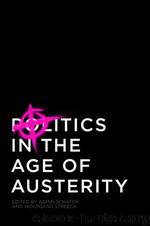Politics in the Age of Austerity by Wolfgang Streeck

Author:Wolfgang Streeck [Streeck, Wolfgang]
Language: eng
Format: epub
Published: 2015-08-13T11:50:13.713259+00:00
Liberalization, Inequality and Democracy’s Discontent1
Armin Schäfer
1 Introduction
In the 1970s, the postwar era came to an end after thirty years of vigorous growth. The collapse of Bretton Woods, rising unemployment, high rates of inflation and industrial strife, and diminished growth rates were unmistakable signs that the trente glorieuses were over. While most observers shared a sense of crisis, they had different interpretations of its causes: while the left claimed that contradictions inherent to capitalism had finally resurfaced and eventually had brought about a ‘legitimation crisis’ (Habermas 1973; Wolfe 1977), conservatives argued that growing political demands for redistribution, wage increases and job security had put an unbearable burden on the capitalist economy; they asserted that ‘government overload’ was at the heart of the crisis. In a democracy, so the latter group reasoned, politicians had to meet voters’ demands in order to stay in office, and rising public expenditures therefore seemed inescapable. The conservative interpretation found much resonance politically, as evidenced by the fact that so many market-oriented parties won political office after 1979. Responding to the economic turbulences of the 1970s, these governments began to remake national economies in the hope of reinvigorating growth. From the 1980s onwards, many countries privatized public enterprises, liberalized markets and started to cut back on the welfare state.
Whatever the economic merits of these cures have been, they did not serve democracy well. Almost everywhere today, fewer people turn out to vote than was the case in the 1970s or 1980s – and turnout is lowest in countries with high inequality. With income inequality growing, citizens seem to have lost their faith in electoral politics as well. Contrary to the ‘government overload’ thesis, democracy’s discontent is actually least pronounced in egalitarian countries with strong trade unions and high levels of public expenditure. In the next section, we will revisit the conservative diagnosis of government overload that occurred in the late 1970s. Section 3 will use broad empirical trends in OECD countries to demonstrate how governments have pursued distributive and regulatory liberalization. Western governments have fended off popular demands for redistribution by asserting the position of the market and reducing their own involvement in economic affairs. Income inequality has consequently increased over the last twenty-five years, as section 4 documents. Section 5 then asks what effect setting markets free has had on the quality of democracy. More specifically, it looks at the impact of inequality on turnout as well as trust in parliament and government. The final section asks what this analysis tells us about the future prospects of democracy in the face of vastly increased debt during the financial crisis. Since governments – independently of their ideological leanings – are forced to cut spending in an attempt to limit deficits, their citizens may grow even more alienated from democratic politics than they are at present.
Download
This site does not store any files on its server. We only index and link to content provided by other sites. Please contact the content providers to delete copyright contents if any and email us, we'll remove relevant links or contents immediately.
| Anthropology | Archaeology |
| Philosophy | Politics & Government |
| Social Sciences | Sociology |
| Women's Studies |
The Secret History by Donna Tartt(19048)
The Social Justice Warrior Handbook by Lisa De Pasquale(12187)
Thirteen Reasons Why by Jay Asher(8893)
This Is How You Lose Her by Junot Diaz(6877)
Weapons of Math Destruction by Cathy O'Neil(6264)
Zero to One by Peter Thiel(5786)
Beartown by Fredrik Backman(5737)
The Myth of the Strong Leader by Archie Brown(5498)
The Fire Next Time by James Baldwin(5431)
How Democracies Die by Steven Levitsky & Daniel Ziblatt(5213)
Promise Me, Dad by Joe Biden(5141)
Stone's Rules by Roger Stone(5081)
A Higher Loyalty: Truth, Lies, and Leadership by James Comey(4951)
100 Deadly Skills by Clint Emerson(4920)
Rise and Kill First by Ronen Bergman(4778)
Secrecy World by Jake Bernstein(4740)
The David Icke Guide to the Global Conspiracy (and how to end it) by David Icke(4701)
The Farm by Tom Rob Smith(4502)
The Doomsday Machine by Daniel Ellsberg(4484)
